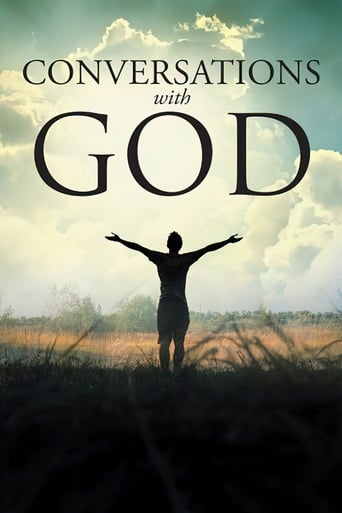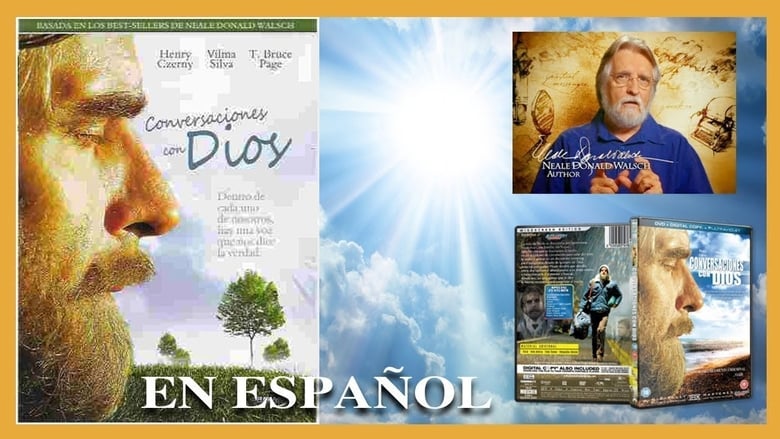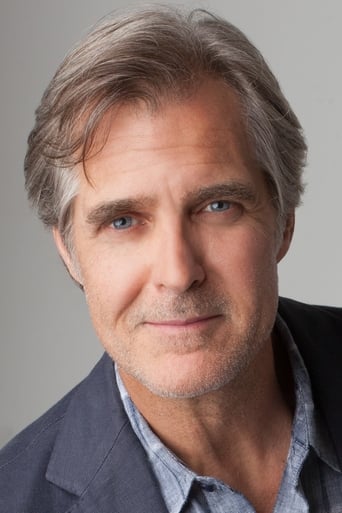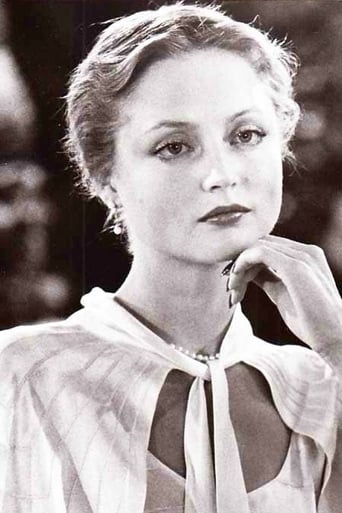

Conversations with God (2006)
"Conversations with God" is the true story of Neale Donald Walsch that inspired and changed the lives of millions. The journey begins after he unexpectedly breaks his neck in a car accident and loses his job.
Watch Trailer
Cast
Reviews
I'll tell you why so serious
I am only giving this movie a 1 for the great cast, though I can't imagine what any of them were thinking. This movie was horrible
It’s sentimental, ridiculously long and only occasionally funny
The story, direction, characters, and writing/dialogue is akin to taking a tranquilizer shot to the neck, but everything else was so well done.
Why Neale Walsch's rise from Bourgeoise, to Homeless, to Nouveux Riche is "touching", and I salute any person who for whatever reason escapes life on the streets. There is one reason Neale Walsch was able to escape the streets: he had not been homeless long enough to have become destroyed as a human being by life on the streets. Many spend practically their entire lives this way. In the movie, Neale W.'s resolution "I will not die in this park!" was the real reason he got off the streets and had nothing to do with his imaginary friend in the Sky. So what is the message of Conversations With God, books or this film? There is nothing new here, and in fact, virtually every tidbit from the CWG ideology is simply a rehash of New Age thought and platitudes and "Motivation Speak". Many higher level corporations use professional motivational speakers to fire up the employees with quasi New Age corporate mysticism, how the Universe is conspiring WITH you, instead of AGAINST you, how God wants everybody to be RICH, how ALL of your problems are basically yours for sitting on your butt and whining, instead of developing a "Can-Do" spirit. We all have heard this crap, and I found, although this is a little info outside of the film, that God's use of stupid word definitions based on treating words as acronyms to be highly unlikely. Here's an example of this New Age Motivation Speak from the book: FEAR means False Evidence Appearing Real. This is the kind of contrived bunkum typical of corporate motivational speakers and New Age gurus who tell people what they WANT to hear, but unfortunately an ideology about as far from reality as possible. We all want to believe that there's a nice sweet loving God up there somewhere in the Sky and when we die we'll live forever in Paradise, and reunite with our loved ones. It's even nicer to believe God is a sweetheart and not the sadistic maniac the Bible makes him out to be. It's nice to think we might live another life with our Soul-mates. All this is pleasant. All this is just swell. And unfortunately is not based on the tiniest fragment of hard evidence. It's all WISHFUL thinking. So who is Neale Walsch? IMO Neale is the World's most successful motivational speaker with all the film-flam, Newspeak, bogus acronyms of his competitors--my personal favorite is S.H.I.T or Super High Intensity Training---and essentially one and the same message. You create your destiny! Remind a beggar child in India--who was abandoned at birth and has spent his entire life living off of garbage and refuse, living in filth and squalor, an illiterate untouchable shunned by society, regarded as totally worthless--- that ALL of his problems are HIS fault for allowing "negativity" to control his life. If he only---like Dr Phil, another ersatz motivational speaker always says---overcame his fears, got rid of his view of a judgmental God, stopped blaming parents or society for his woes and reached down and pulled some Get-Go out of his derrière, his life would turn around! If he thought positive and stopped whining, why his life would go from Hell to Heaven (poof! like magic--which is all this crap is anyway), and next thing you know, he'd be signing his runaway bestseller at Barnes and Noble, and selling movie rights to his books for 25 million dollars. Some people just can't tell the difference between FANTASY and REALITY. Reality is sometimes good, and sometimes rather rotten. Did the 31 students killed by CHO seek their murder to fulfill some spiritual purpose, teach their parents a valuable lesson in Love? Walsch would say they did. The Universe "conspired" FOR their benefit and always will. If I were the father of one of the deceased students and Neale started spouting this absolute fantastic and contrary-to-fact pseudo motivational malarkey, he'd get a one-way ticket to the afterlife.
If you've been wondering whether this movie accurately reflects the beloved book series, wonder no more. I can confirm it absolutely does...very effectively! I saw the movie last month (September 2006) at an advance screening in Minneapolis. Stephen Simon (producer/director) has artfully interwoven the message of the books with Neale Donald Walsch's story of homelessness, healing and unexpected acclaim. If that's enough to launch you in the direction of the nearest theater showing "CwG," you can stop right here. Or if you'd like to hear more, keep on reading.I'd never claim to be unbiased in my enthusiastic endorsement of this movie. Here's why: I met both Stephen and Neale during my years of working with WISDOM TV/Media Group (DISH Network, Ch. 264). I took an 8-week spiritual cinema telecourse from Stephen. And I worked a book signing for Neale after he wrote "Friendship with God." It was great to chat with both of them again in Minneapolis. As beings of compassion and integrity, Stephen and Neale just get better with the years. And I came home with a CD of the signature soundtrack (composed especially for the film by Emilio Kauderer) and an autographed copy of a beautiful coffee table book about the making of the movie (in Ashland, OR)."Conversations with God" is wonderfully entertaining, dramatically moving, and oh-so-uplifting! Getting lost in our heads (a great way to retreat from the edge of our comfort zone) won't serve us here, or do justice to the incredible gift of this movie. Giving our hearts (and our imaginations) permission to let Neale's story become our own, if only for the 109 minutes this movie takes, just might. It did for me. I love abstract ideas, and I'm sure a lot of you out there do too. In this case, let the art of the movie do its own communicating...there's no way it won't! The movie is fabulous in its cinematics and message.In his treatment of Neale's life story, Stephen also crafted a powerful cinematic statement about homelessness. It reflects Neale's real-life practice of compassion toward the homeless because of his own painful experience. (As Neale said to the audience after the screening, tongue-in-cheek, "You never know which next bestselling author you might be helping.") When Stephen asked Neale before production began what, in the end, his "CwG" experience had done for him, he replied, "It gave me back to myself." That this gift was a direct result of that down-and-out time in Neale's life is just one piece of the larger miracle. In case any of you remember Canadian actor Henry Czerny's name from the movie "Mission Impossible" (1996) or "Clear and Present Danger" (1994), his performance here as Neale is spectacular!When you see the movie, I think you'll love Stephen's sensitive use of special effects to portray "giving Neale back to himself." These days the term "special effects" often means the slam-bam, shock-and-awe images of action films. Here Stephen demonstrates how such techniques can create incredibly tender effects with a goal 180 degrees from that. Check out his Spiritual Cinema Circle websites at www.spiritualcinemacircle.com; www.spiritualcinemanetwork.com...and treat yourself to a special night out at the movies!Cheers, Mary
This is an abridged version of a review being published at www.seedsofunfolding.org What if you sneezed, and God blessed you in your own voice? This is the relationship with the Divine posited by Conversations with God (hereafter "CWG"), a new movie directed and produced by Stephen Simon and based on Neale Donald Walsch's well-loved series of books of the same name. Rather than focusing on kernels of divine wisdom that fans of the books might have expected, the film takes a biographical route. We follow Walsch's involuntary displacement from normal life, his descent into despair and the dark night of the soul and then his ultimate resurrection after he finds the inner voice he identifies as God.Henry Czerny stars as Walsch, and there are few moments in the film in which he is not center stage. He is at his best when, recognizing just how far he has fallen, he desperately gulps a half-eaten hamburger he has rescued from a garbage dumpster. He just as easily slips into the persona of a slicker version of Walsch on the New Age talk circuit.CWG takes a non-apologetic approach to the possibility that we each can find and depend upon a loving, guiding and nurturing inner voice. Just in case any member of the audience thinks that the movie is designed merely as a love-note to Neale Donald Walsch, in a brief coda following the closing credits the filmmakers ram home the point that we each can have these divine conversations on our own.Some critics may quarrel that it is either arrogance or madness to claim that a person's inner voice is God. Yet even the staunchest atheist would have to admit some truth to the principle that problems cannot be resolved from the same state of consciousness in which they were created. This in turn implies that there exists a possibility, accessible to each of us, to find ever-expanding perspectives and states of consciousness from which we can express wisdom far beyond the limits of our ordinary lives. When someone is capable of reaching such a place, it hardly matters whether you call it "God," "Divine Mother," "myself" or "George Washington." Some of the elements of the philosophy of Walsch's God may be difficult to swallow, even for card-carrying members of the New Age. For instance, the thought is expressed that when choosing how to make a living, the highest good is to do what you love. Contrast this with the fundamental message of love-what-you-do from Peaceful Warrior, another spiritually oriented film this year based on a semi-autobiographical bestseller.There is certainly something to be said for CWG's approach of don't-do-it-if-it-doesn't-feel-good. However, one can imagine many who would rely on this value as justification for avoiding the commitment to confront and work through a difficulty and instead attempting to seek happiness by shifting from job to job and location to location and flitting from mate to mate.Interestingly, the movie makes recurring reference to Walsch's own difficulties with love and commitment to the people for whom he cares. He acknowledges these problems and admits to his past and continuing mistakes. One wonders whether these recurring patterns in his life might have been influenced by responses he received from his inner voice that he wanted to hear, rather than what he needed to hear. This issue of wants versus needs means that anybody who seeks to embark on a path of developing such an inner dialogue must also develop the power to discern between which responses serve well and which responses are merely self-serving.Another philosophical premise that the film presents with difficulty is a disquieting approach to the economics of spiritual life. With Neale Donald Walsch as the center of attention in this autobiographical film, we are witness not only to his wanderings through a life of poverty but also to his emergence into a world of economic plenty and riches which are awarded to him in direct response to his ability to express himself to an audience interested in spirituality. The implicit message is that spiritual pursuits bring, or can be converted into, material rewards.While on the speaking circuit, Walsch comments to a friendly group, "Imagine a world where money was given to people who give us the biggest gifts." The problem is that most of us are taught, and believe, that a gift is given freely, with no strings, and not with a view towards measuring the return on investment. Walsch's statement conflicts with this basic understanding of what it means to give a gift. How can these two thingsthat we let go of gifts without control versus getting money for our giftsbe reconciled? Contrast CWG's concept of being paid for gifts with the sense of offering presented in Peaceful Warrior. In that movie, protagonist Dan Millman questions the apparent lack of success of Socrates, the gasoline station attendant who becomes his mentor. "You know so much, how come you're working at a gas station?" Millman asks. Without an ounce of defensiveness, Socrates responds, "This is a service station. We offer service. There's no higher purpose." In spite of doubts about some of the spiritual messages conveyed by CWG, viewers looking for inspiration will certainly be rewarded by a sprinkling of teachings in the film. For instance, God tells Walsch as he walks out of his bedroom, "To live your life without expectation, without the need for specific results, that is freedom." Perhaps this thought is the antidote for those who would seek to engage in spiritual pursuits for the hope of some reward.Few can doubt the sincerity with which Walsch and director/producer Stephen Simon (producer of Somewhere in Time and What Dreams May Come and co-founder of the Spiritual Cinema Circle DVD subscription service) bring to their project. Yet as a film-going experience independent of its message, CWG is not entirely satisfactory.
I saw a preview of this movie on Oct 22nd and very much enjoyed it.Except for the main character's fake beard which I also found distracting (see someone else's post on this), this was a good, thought-provoking film. The overall theme should resonate with people who feel there's more to our existence and for that matter, what God is, than what we've been taught to believe in church. Probably not a movie for the extreme religious zealots out there or atheists either.But, this is not some sort of exploitative, religious flick. You won't be hit over the head with a holier-than-thou guilt trip. And I'm not sure this or any other movie can change anyone's life either, as some may suggest. It is inspirational, though.I've never read the books, but the author truly believes what happened to him and the movie simply chronicles his story. This sort of movie is a good way of sharing such a story with lots of others and hopefully this one was not produced just to pocket more profits. I hope it is well-received and stays at the theaters for a long run.


